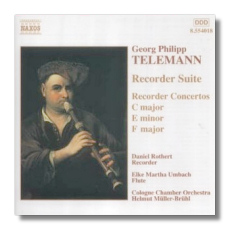
The Internet's Premier Classical Music Source
Related Links
- Telemann Reviews
- Latest Reviews
- More Reviews
-
By Composer
-
Collections
DVD & Blu-ray
Books
Concert Reviews
Articles/Interviews
Software
Audio
Search Amazon
Recommended Links
Site News
 CD Review
CD Review
Georg Philipp Telemann

Suite & Concertos for Recorder
- Suite in A minor for Recorder, Strings & Continuo, TWV 55:a2
- Concerto in C Major for Recorder, Strings & Continuo, TWV 51:C1
- Double Concerto in E minor for Recorder, Flute, Strings & Continuo, TWV 52:e1
- Concerto in F Major for Recorder, Strings & Continuo, TWV 51:F1
Daniel Rothert, recorder
Elke Martha Umbach, flute
Cologne Chamber Orchestra/Helmut Müller-Brühl
Naxos 8.554018 DDD 74:46
The A-minor Recorder Suite is one of Telemann's most popular works. It's also unusually extended for a work of this genre; it is in seven movements and requires about a half-hour to perform. Telemann's interest in music from different regions of Europe is demonstrated here. A French-derived Ouverture opens the suite, and the other movements include an "Air à l'Italien" and a Polonaise to remind us that the composer spent part of his career in Poland as a Court Kapellmeister.
The Double Concerto is a little less familiar, but I find it to be an even more attractive work. It's in four movements instead of the usual three, and the Presto finale is unmistakably influenced by country dancing, with its bagpipe-like drone and its vertiginous acceleration near the end. Telemann's intimate understanding of the two solo instruments keeps the ears both interested and beguiled.
The two solo concertos, also both in four movements, demonstrate Telemann's variety. The C-major concerto is the more modern-sounding of the two, and it shows the influence of the Italian school. The dignified F-major concerto is not Italianate at all. The second movement challenges the soloist's control and virtuosity with sustained high notes that must ring out over the accompaniment, and with rapid figurations, like a coloratura soprano's vocal exercises.
Soloist Daniel Rothert's annotations are good, but I would have appreciated more documentation about the music than simply its key – were there no TWV numbers? Collectors not wishing to duplicate the contents of other discs already in their collections might find this frustrating. These works are thought to have been written circa 1740.
The Cologne Chamber Orchestra plays on modern instruments; Rothert and Umbach seem to be playing on modern copies of period instruments. At times the orchestra threatens to cover the soloists, but all in all the balance is good. Stylistically, the contrast is noticeable although not irritating. Even though both the soloists and the orchestra play conservatively, my interest never flagged over the course of 75 minutes.
Speaking of which, the inset card shaves eleven minutes off of this CD's total timing, so this CD is an even better value than it gives itself credit for. The recording was made in Deutschland Radio's Cologne studios, and it is top of the line.
Copyright © 2002, Raymond Tuttle


















